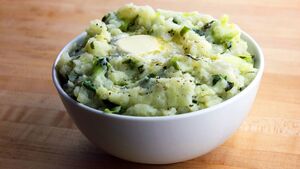Living Greener: Delicious cabbage recipies

One of the easiest ways of making cabbage, of course, is in colcannon
NOW that most other crops have died off for the winter, you might have a garden full of brassicas. Brassicas – the cruciferous vegetables of the cabbage family – made a long and fruitful journey from the scraggly sea kale of its ancestor; today is provides us with one of our healthiest, easiest and most versatile crops, bred for its leaves (cabbage, kale, Bok Choi), its roots (kohlrabi), its flowers (broccoli, cauliflower) its seeds (mustard) and its buds (Brussels sprouts).
Such crops particularly suit Ireland, as they like lots of sun and water but not too much warmth – our summers, in other words. Moreover, many of them continue to produce throughout the year; if you grow kale, you can keep them outside through the winter and continue to pick off leaves until spring. You can sow summer cabbage in early April and start them three or four weeks earlier in small trays of soil. Plant them in well-composted soil, as they are hungry plants, and make sure the soil is firm enough to support their weight.
Brassicas do attract a number of diseases and pests, so rotate them around your garden, and don’t plant them where there have been brassicas in the previous few years. We often put netting over our brassicas to protect them from the familiar cabbage butterflies, but they are large plants, and their leaves often pressed against the edge of the netting, leaving them accessible to the butterflies. Even with netting, you need to check for caterpillars, and for that I recommend conscripting child labour and make a game of it. Take a group of children and pay them each a penny or a sweet for every caterpillar they can find and give them the additional pleasure of squashing them.
When you harvest a cabbage, cut a cross in each stem, and each quarter will sprout baby cabbage leaves – not as big a crop as the initial head, but it does give you a bit more mileage out of a single plant. I find it best to dry and burn the cabbage stems when done rather than composting them, to avoid the risk of infecting the compost with cabbage diseases.
One of the easiest ways of making cabbage, of course, is in colcannon: all you need is rashers, cabbage, an onion, and a potato. Boil some potatoes until soft in the middle, and while they’re boiling, slice up the rashers, dice some onions and chop up a cabbage. I slice my rashers a few centimetres wide, my onions about a centimetre on the side and my cabbage about three-centimetre chunks, but it’s up to you. I also use a big fistful of parsley – about 20 grams, washed and drained, with the thicker parts of the stems removed.
Once the potatoes are boiled and out of the water you take a pan, add 10 ml of oil and a dab of butter, put on medium heat and coat the bottom of the pan. Throw in the rashers and cook them until crispy, add the onions and cook for about a minute, then throw in the cabbage, and cook for a few minutes or until the onions are golden-brown and the cabbages are cooked through. In the few minutes that they will take to cook, mash the potatoes. Next, chop up about 20 grams of parsley, and throw into the pan to cook for a moment. Finally, add the mash and mix it all together.
I often make my daughter cabbage salad, or coleslaw – or just slaw, as we put it. To make this I’d often slice up a head of cabbage — say, 1 kilo — thinly in a mandolin or with a knife, and add 200g of shredded carrots, 100g of walnuts, 100g of diced apples and 50g of crumbled blue cheese. If you make mung bean sprouts at home, they make a great addition as well.
Then make a sauce of 200ml mayonnaise and 200ml olive oil, with 50ml lemon juice, 20ml dark soy sauce, 10g mustard powder, 10g garlic powder, 5g cayenne, 10g salt, 5g pepper. Mix it all together well and serve.
Of course, you can also cook it into colcannon, ferment it into sauerkraut or kimchee – but I’ll leave those for future columns.





